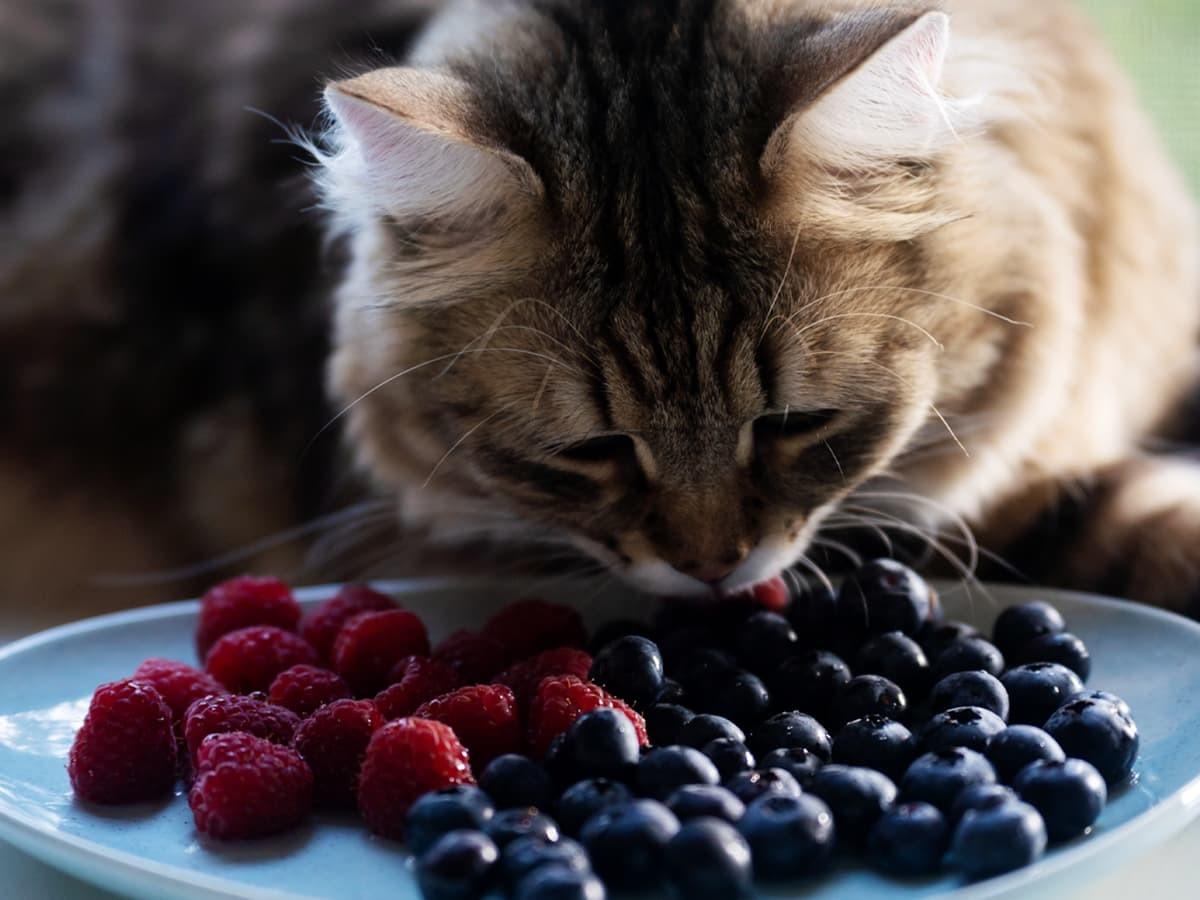Which Berries Can Cats Eat?
Before diving into the specifics of different berry varieties and whether they are safe for cats, we first need to ask if cats can eat berries at all.
Can Cats Eat Berries?
Yes! As long as your cat is not diabetic, they can consume berries. Blueberries, blackberries, raspberries, and strawberries are okay to feed to cats in moderation.1 But keep in mind, that these fruits are heavy in sugar, so feeding even to a healthy cat in big quantities might result in diarrhea, constipation, and stomach distress. As a result, reducing fruit treats to less than 10% of your cat's diet is critical.2
Before determining if berries are healthy for cats, cat owners must first assess their feline's health. Berries can be harmful to diabetic cats in any quantity because of their high sugar content. Healthy cats can enjoy berries but there are two things you will want to keep in mind.2
1. A healthy cat should only have one or two berries a day. This is to keep the treats to under 10% of their daily caloric intake.
2. Always speak with your veterinarian before introducing any fruit into your cat's diet. Your vet will have the best gauge of whether the new treat will be beneficial to your pet.
What Foods Normally Make Up a Cat's Diet?
A cat's natural diet consists predominantly of meat-based meals. This is because cats are obligate carnivores, meaning they require a diet primarily composed of animal-based proteins to flourish. Small prey such as rodents, birds, and insects comprise felines' natural diet in the wild. Commercial cat meals of high quality are developed to fulfill the nutritional demands of domesticated house cats and frequently contain animal proteins such as chicken, turkey, beef, or fish.
Feeding an indoor cat a meal that is similar to its natural diet is critical for mental well-being and maintaining a healthy weight. Puzzle feeders can help a house cat keep calories down and recreate some of its predatory mindset. They are suitable for both dry and wet food.
In addition to overfeeding domesticated felines, some pet owners may be tempted to feed their cats human foods. However, not all human foods are safe for them, and even fewer are required. Blueberries, blackberries, and raspberries, for example, are not required in a cat's diet. Cats have little to no sweet taste receptors, and their digestive systems do not handle plants well. As a result, there is no need for cats to eat berries or other fruits even though they can enjoy certain varieties as snacks. To guarantee maximum health and mental well-being, it is important to keep to a diet that meets their biological requirements.
Can Cats Taste Berries?
Berries can be sweet, sour, or tart. Cats do not have sweet taste receptors on their taste buds so they cannot taste the sweetness of the berries, only the sour or tart taste.
As a result, cats connect berries with an unpleasant sour or tart flavor. Interestingly, because it is in a cat's inclination to avoid unpleasant food, your cat may dislike eating berries. If your cat does enjoy eating berries, they may eat way too many, eating a large amount of sugar without realizing it. This is dangerous to your pet's health and puts them at risk of obesity and diabetes.
Which Berries Can Cats Eat?
Let's look more closely at the berries that cats can consume. If you want to give your cat berries, you may want to save the treat for important occasions or holidays, like their birthday!
Can Cats Eat Raspberries?
Cats can eat raspberries. They include a lot of antioxidants, fiber, and flavonoids, which have antioxidant properties. They also include vitamins C and E. As a result, a bite-sized piece is both safe and healthy for cats.
Can Cats Eat Blackberries?
Cats can eat blackberries. Blackberries are abundant in antioxidants, flavonoids, and fiber, just like raspberries. They also include vitamins C and K, as well as magnesium. Again, a tiny slice is safe for your cat, and the small portion also helps prevent choking.
Can Cats Eat Blueberries?
Blueberries are also healthy for cats to eat in modest amounts. The berry is high in antioxidants, flavonoids, fiber, vitamins C and K, magnesium, and potassium, and is also low in salt and fat.
Can Cats Eat Cranberries?
Cranberries include antioxidants, flavonoids, and fiber that are suitable for cats. They also include vitamins C, K, and E, as well as magnesium. However, cranberries are high in sugar. As a result, use this fruit sparingly and only on exceptional occasions.
Can Cats Eat Strawberries?
Strawberries are surprisingly low in sugar, but they still contain it, so only give your cat modest amounts. The fruit also includes vitamin C, magnesium, and antioxidants.
When Are Berries Bad for Cats?
Berries offer no significant advantage to felines since their digestive systems do not require a plant-based diet. If you choose, you may give your cat tiny amounts of the berries on our list in moderation.
Feeding hazardous berries to cats should be avoided at all costs. Winterberries, for example, are harmful to both cats and humans. These berries contain saponins and cyanogenic glycosides, which can be dangerous if consumed.
If a cat swallows a hazardous fruit or plant, they may experience gastrointestinal distress, vomiting, diarrhea, and abdominal discomfort. In more severe situations, or if significant amounts are consumed, it may cause problems such as difficulties breathing or convulsions. Poisonous berries and plants must be kept out of reach of cats to avoid accidental eating and associated health concerns.
Expert Insights From Spot
While it may be tempting to share meals with your cat, it's crucial to be aware that not all human foods are safe for pets. Spot's internal data shows that pet insurance claims for dietary indiscretions average $642*, highlighting the importance of being cautious and informed before giving your cat a taste of our food.
How Can Berries Be Safely Added to Cat Food?
You cannot just place berries in your cat's food bowl and allow your pet cat to eat them. There are a few more things you need to know before you can safely introduce berries to your cat's diet. Here's how to give berries to cats safely:
Do’s
Check for Freshness - Before giving your cat any berries, check to be sure they are fresh. If your cat consumes moldy berries, it can develop a variety of health problems. These symptoms might include vomiting, tremors, hyperactivity, and fever. So, always offer your cat fresh fruit.
Clean the Berries - Wash the berries to eliminate any dirt and chemicals. Next, consider tiny servings and limit your cat to no more than 2 or 3 berries.
Mix the Berries With Other Foods - The next stage in incorporating berries into cat food is to chop them into small bits or mash them to make a paste. Once you've cut the berries into little pieces, or created your paste, combine them with your cat's favorite meal and give it to them to try. Surprisingly, you can also give your cat mixed berries.
Don’ts
Berry Flavored Cat Food - You may come across berry-flavored cat food when browsing for meals. Although berry-flavored cat food might sound like a good idea, it may contain chemicals and preservatives that are damaging to your cat's health. Instead of feeding berry-flavored cat food, acquire fresh berries and add them to your bowls during mealtime.
Don't Give Your Cats Any Berries You Aren't Sure Are Safe - For example, grapes, raisins, and currants are all fruits that cats should never eat. These fruits are toxic to cats and are hazardous to their health.
Conclusion
Berries may be eaten by cats in modest amounts. Two or three berries at a time are typically regarded as safe for cats. Any more may cause digestive issues.

As Spot’s resident cat enthusiast, I am dedicated to researching and sharing information that helps pet owners take the best care of their pets. Pet ownership comes with it’s share of challenges, but my goal is to help make this journey easier.
*Claim reimbursement examples are based on administrative data from 2019 to 2024. Actual reimbursement amounts may vary depending on plan type and options, including annual limit, co-insurance, and annual deductible, as well as the specifics of the claim and your policy terms.
Ward, Hayley. "Can Cats Eat Berries?" Trusted House Sitters, 5 Dec. 2023, https://www.trustedhousesitters.com/blog/pets/can-cats-eat-berries.
Khatri, Annie. "Cat Cats Eat Berries?" Your Cat Gal, 23 Feb. 2024, https://yourcatgal.com/can-cats-eat-berries.
The information presented in this article is for educational and informational purposes only and does not constitute or substitute for the advice of your veterinarian.












